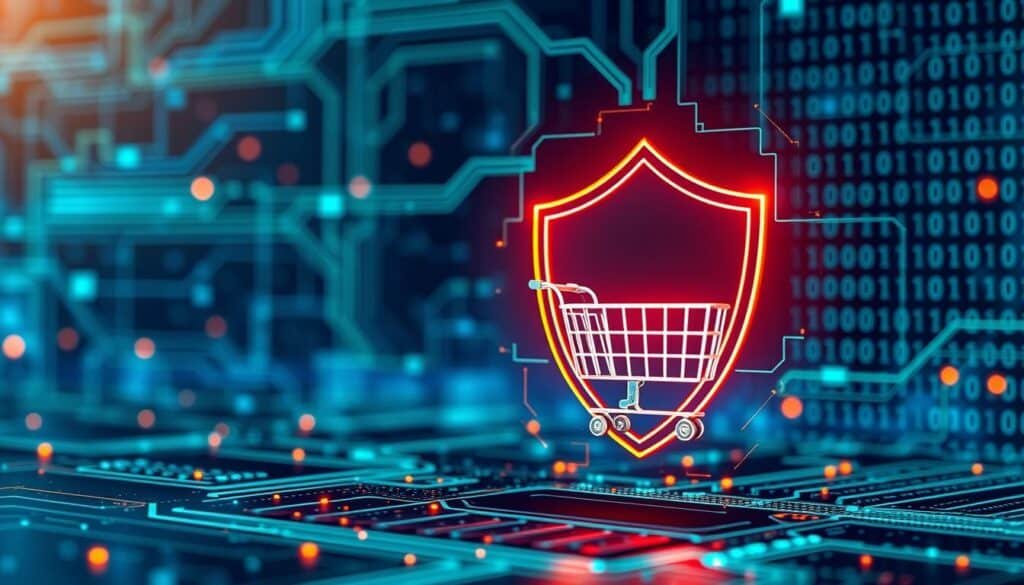Online shopping has changed how we buy things, making it easy and offering lots of choices. But, finding the best deals online can be hard with so many offers out there. We’ll share some top tips to help you shop online better and save more money.
Key Takeaways
- Familiarize yourself with reputable online retailers and their sales policies
- Leverage price comparison tools to find the best deals
- Utilize coupons, promo codes, and cashback offers to maximize savings
- Beware of “too good to be true” offers and scams
- Understand shipping costs and return policies before making a purchase
Secure Your Online Shopping Experience
When shopping online, keeping your transactions safe is key. Use a secure connection and know the merchant to protect your info. These steps help keep your personal and financial details safe.
Ensure Safe Transactions
Always shop from a secure connection. Make sure your computer is safe from harmful software. Turn on your computer’s firewall and use a secure wireless network. Never share financial info on public networks as they can be risky.
Get to know the store you’re buying from. If you’re familiar with the store, shopping online is safe. If not, check their reviews first. Be cautious of deals that seem too good to be true. Always read the terms and conditions when buying a gift card.
Don’t share more info than needed, and use a unique and strong password. Keep your personal information, like your social security information and driver’s license number, safe. Make sure you understand the site’s privacy policy to keep your data secure.
Identify Reputable Online Stores

When you shop online, it’s key to find stores you can trust. The store’s reputation affects your shopping experience and keeps your info safe.
Start with stores you know and trust. These are places where you’ve had good experiences before. If you don’t know the store, do some research on it.
Look at review sites for e-commerce businesses. Find stores with good reviews from past customers. Stay away from stores with bad reviews or none at all. They might not be safe or reliable.
Also, read the store’s privacy policy to see how they handle your personal information. Good online stores will have a clear policy about their data practices.
| Criteria | Reputable Online Store | Questionable Online Store |
|---|---|---|
| Reputation | Positive reviews and testimonials from previous customers | Lack of reviews or negative feedback |
| Privacy Policy | Clear and transparent policy on data handling | Unclear or missing privacy policy |
| Legitimacy | Legitimate and well-established brand or business | Questionable or unknown identity |
Keep these factors in mind to safely shop online. This way, you can find reputable online stores for a good shopping experience.
Protect Your Personal Information

When you shop online, be careful with the personal information you give to sellers. You usually need to share payment info, your address, phone number, and email. But, don’t share things like your social security number or driver’s license number. Always check the site’s privacy policy to know how they use and share your data.
Keeping your data safe is key. Use a unique and strong password for every online account. This stops others from getting in and keeps your personal information safe. Also, check for “https:” in the web address to make sure the site is secure and encrypted.
Secure Your Online Transactions
When buying things online, make sure the site is secure and encrypted. Check for a padlock icon or “https” in the URL. Don’t buy things on public Wi-Fi because they’re not safe. Use a private and secure internet to shop online.
| Personal Information | Secure Practices |
|---|---|
| Social Security Number | Never share this sensitive information online |
| Driver’s License Number | Avoid disclosing this personal identifier |
| Password | Use a unique and strong password for each account |
| Payment Details | Look for “https” and a padlock icon to ensure a secure connection |
Payment Methods for Online Shopping

Choosing the right payment method is key to keeping your financial info safe online. Credit cards and digital platforms like PayPal are top choices for security. It’s important to know the differences between them.
Liability is a big factor to think about. Credit card purchases limit your liability to no more than $50 of unauthorized charges if your financial information is stolen. This means you won’t be on the hook for most fraud charges if someone gets your card info. Debit cards don’t offer the same protection, since they take money straight from your bank account.
To boost your online shopping safety, consider having a special credit card just for the web. If that card gets hacked, you can close it without affecting other accounts. Stay away from checks or direct bank transfers, as they don’t protect you much against fraud.
With digital payment platforms, services like PayPal add an extra security layer by keeping your financial info private from sellers. This is great for shopping at new or less-known online stores.
For a safe online shopping experience, be proactive in protecting your financial details. Pick the right payment method and follow good practices. This way, you can shop online safely and avoid fraud or unauthorized charges.
Evaluate Shipping and Return Policies

When shopping online, it’s key to look closely at the shipping terms and conditions. Some stores might have high shipping fees that could cancel out the savings from a deal. Make sure to check on tracking, insurance, and the carriers used for a smooth delivery.
It’s also vital to know the store’s return policies. This includes how to get refunds or exchanges if you need to return something. This info helps you make a smart choice and dodge any delivery or return problems.
- What are the shipping fees for different delivery options?
- Does the store offer tracking and insurance for your items?
- Which carriers are used for delivery, and are they reliable?
- What is the return process, and how long do you have to return an item?
- Are there any restocking fees or other charges associated with returns?
Understanding the shipping terms and return policies helps you make better choices. This way, you can have a smooth shopping experience, whether you’re into online sales and discounts or just making a regular buy.
Online Shopping Security and Protection

When you shop online, keeping your information safe is key. Using a good internet security program helps protect your personal and financial details. These tools have strong anti-phishing and identity theft protection to watch over you in real-time.
Enhance Your Online Safety
In today’s digital world, keeping your online shopping safe is a must. Making sure your transactions and data are secure is crucial for a good shopping experience. With strong internet security tools, you can shop online safely, knowing your info is protected from threats.
- Use a trusted internet security program with top-notch anti-phishing and identity theft protection features.
- Be on the lookout for any odd activities or signs of a breach that could risk your online safety.
- Check your financial statements and credit reports often to spot any unauthorized transactions or identity theft.
Being proactive with your online security is the best way to fight digital threats. Protecting your personal and financial info lets you shop online safely and smoothly.
“In today’s digital age, keeping your online presence safe is crucial. The right internet security program is your best friend for secure online shopping.”
Also Read : How Can I Attract Customers To My E-Commerce Website?
Conclusion
Online shopping has changed how we buy things, making it easy and fun. But, we must be careful to stay safe while shopping online. It’s important to know how to shop safely.
This article has given you tips to make online shopping better and safer. You can now protect your transactions and find trustworthy stores. You also know how to keep your personal info safe and understand shipping and return policies.
Being informed and careful is key to good online shopping. By making smart choices and focusing on your safety, you can enjoy the perks of online shopping. This includes great sales and discounts, all in a secure way. So, enjoy the digital shopping world, but always keep your personal information and payment methods safe.
FAQs
Q: How can I ensure I am getting the best deal when shopping online?
A: To get the best deal, compare prices across multiple websites and platforms, look for coupon codes on social media or deal websites, and consider signing up for newsletters from your favorite retailers to receive exclusive offers and alerts on sales.
Q: What should I do if I receive the wrong item after making a purchase online?
A: If you receive the wrong item, contact the seller or customer service of the website where you made the purchase. Most retailers have a refund and return policy that allows you to return the incorrect item and receive the correct one or a refund.
Q: How do I use my credit card safely when making online purchases?
A: Always ensure that the website you are shopping on has encryption (look for “https” in the URL). Use secure networks, avoid public Wi-Fi, and consider using virtual credit cards or payment apps for added security when making online purchases.
Q: What are the benefits of using apps for online shopping?
A: Shopping apps often provide a more user-friendly experience, exclusive app-only deals, and notifications for sales or promotions. They also allow you to easily track your orders and manage your shopping cart from your mobile device.
Q: How can I track my package after making an online purchase?
A: After you make a purchase, the seller should send you a confirmation email that includes tracking information for your package. You can use this information on the carrier’s website to monitor the delivery status of your order.
Q: Are there specific times when online sales are more common?
A: Yes, many retailers have major sales during holiday seasons, Black Friday, Cyber Monday, and at the end of the season clearance sales. Additionally, some brands may offer discounts during special events or anniversaries.
Q: What is the difference between clearance items and regular sales?
A: Clearance items are typically products that retailers are trying to sell off to make room for new inventory, often at significantly reduced prices. Regular sales may involve discounts on a selection of items but do not necessarily indicate that the items are being discontinued.
Q: How can I personalize my online shopping experience?
A: Many e-commerce platforms allow you to create accounts where you can save your favorite items, receive personalized recommendations based on your purchase history, and set preferences for what types of deals or items you are interested in.
Q: What should I consider when shopping for clothing and shoes online?
A: When shopping for clothing and shoes online, check the size charts provided by the seller, read customer reviews for fit and quality, and familiarize yourself with the return policy in case the item does not meet your expectations.
Q: How can I find valid coupon codes for online shopping?
A: Valid coupon codes can often be found by searching on coupon websites, following retailers on social media for exclusive offers, or signing up for newsletters that may include promotional codes for discounts on future purchases.
Source Links
- https://www.convertcart.com/blog/online-sales-promotion-ideas-ecommerce
- https://www.webroot.com/us/en/resources/tips-articles/10-tips-to-safer-shopping-online
- https://www.kiplinger.com/personal-finance/shopping/online-shopping/601523/deal-sites-and-tools-for-finding-online-bargains





